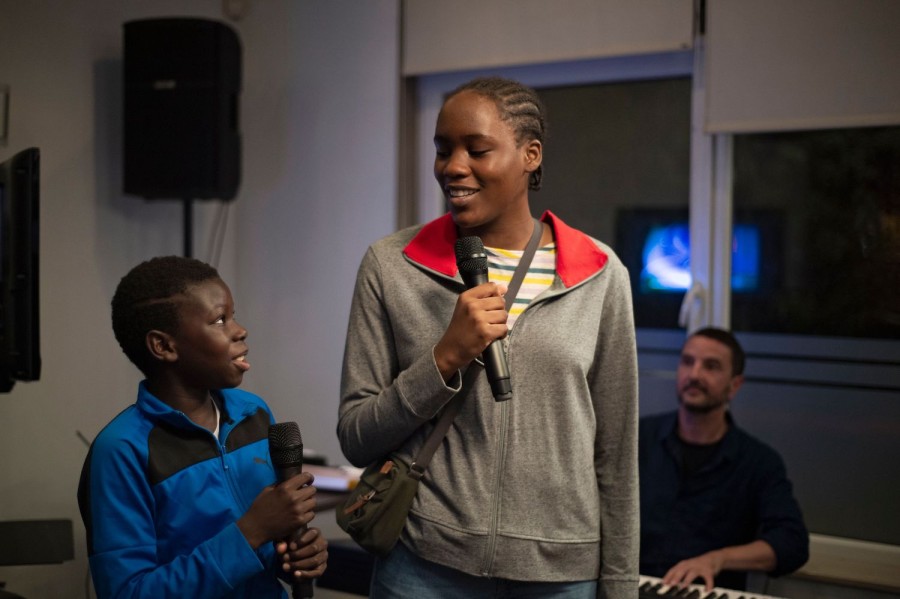Review: The sobering reality of exile in ‘Tori and Lokita’
In their latest film, the Dardennes bring attention to the tragic reality of the European immigration crisis and its effects on a young generation of exiles fighting for a new life.
Actress Joely Mbundu (right) as Lokita and actor Pablo Schils (left) as Tori in the film “Tori and Lokita.” (Courtesy of Janus Films)
April 12, 2023
In Jean-Pierre and Luc Dardenne’s latest film, “Tori and Lokita,” the two award-winning directors turn their camera toward the unjust struggles faced by immigrants in contemporary Europe. Masters of realist filmmaking, the Dardennes continue their thematic exploration of society’s dispossessed and forgotten, this time through the youthful eyes of two African children fighting to survive on foreign soil. A resilient sibling bond resists the unbearable pressures of soulless bureaucracies, traumatic pasts and an exploitative criminal underworld.
The Dardennes subject audiences to 88 minutes of anxiety, heartbreak and anger to highlight the urgent realities of the ongoing immigration crisis, creating a powerful plea for the fates of countless displaced children around the world.
The film opens with a close-up shot of Lokita (Joely Mbundu) as she is interviewed by a Belgian immigration officer. She claims that Tori (Pablo Schils) is her brother, but her story is vague and full of holes. If she can’t prove her blood relationship to Tori, she risks being separated from him and losing her immigration status. Despite the questionable legitimacy of their siblinghood, Tori and Lokita have an undeniable bond, constantly doing whatever it takes to stay together and support one another. Even as they fall deeper into the corrupt underbelly of Belgian society, they never fail to share heartfelt moments of carefree innocence and mutual compassion.
The film’s resonant emotional core lies in the naturalistic performances delivered by Mbundu and Schils. In their debut feature film roles, both actors convincingly portray a sibling synergy; the way they speak and act around each other feels genuine and raw. This performance plays into the Dardennes’ deconstruction of the family unit. The two children’s experiences as young exiles in hostile territory have calcified their co-dependent bond. While doing research for the film, the directors encountered new research which suggested that lonely “unaccompanied exiled minors” were prone to unique illnesses. This made both directors always put the characters’ unorthodox sibling bond front and center.
Like in their other works, the Belgian filmmakers maneuver the camera dynamically, making audiences feel as though they are the third accomplice in Tori and Lokita’s story. Their signature handheld camerawork and lack of non-diegetic music give the film a documentary feel, making the depiction of the pair’s experiences even more distressing. As the camera tracks the young duo perilously navigating the bleakest corners of urban life, the viewers share the crushing hopelessness of their situation. Especially in the third act of the film, the camera is essentially on the run with the two children during a stress-inducing chase sequence.
While the Dardennes have always engaged in socially conscious filmmaking, some critics have dubbed “Tori and Lokita” their “angriest” narrative thus far. Throughout their filmography, the brothers have always displayed a cinematic obsession with marginalized groups in modern European society. Whether it was exploring the struggles of working-class teenagers in “Rosetta” or the damaging psychological consequences of abandonment in “The Kid with a Bike,” the Dardennes have consistently called attention to desperate young people on the fringes of society. However, in this latest film, they center the immigrant experience, choosing to instead focus on the inhumane treatment of migrant children in Western European society. The whole film is a brutal indictment of democratic institutions that have failed to protect a generation of children from physical harm and exploitation.
In a world governed by apathetic bureaucrats and heartless criminals, the Dardennes portray the unbreakable spirits of the downtrodden. Even when engulfed in a world of darkness, dignity and love prevail, no matter the consequences. Both characters repeatedly defy systemic oppression and insurmountable societal obstacles to stand by one another. “Tori and Lokita” celebrates the resiliency of the human spirit, but also creates a sense of urgency surrounding the continued maltreatment of immigrants trapped in the European legal system.
“Tori and Lokita” is currently showing at the IFC Center.
Contact Mick Gaw at [email protected].



























































































































































